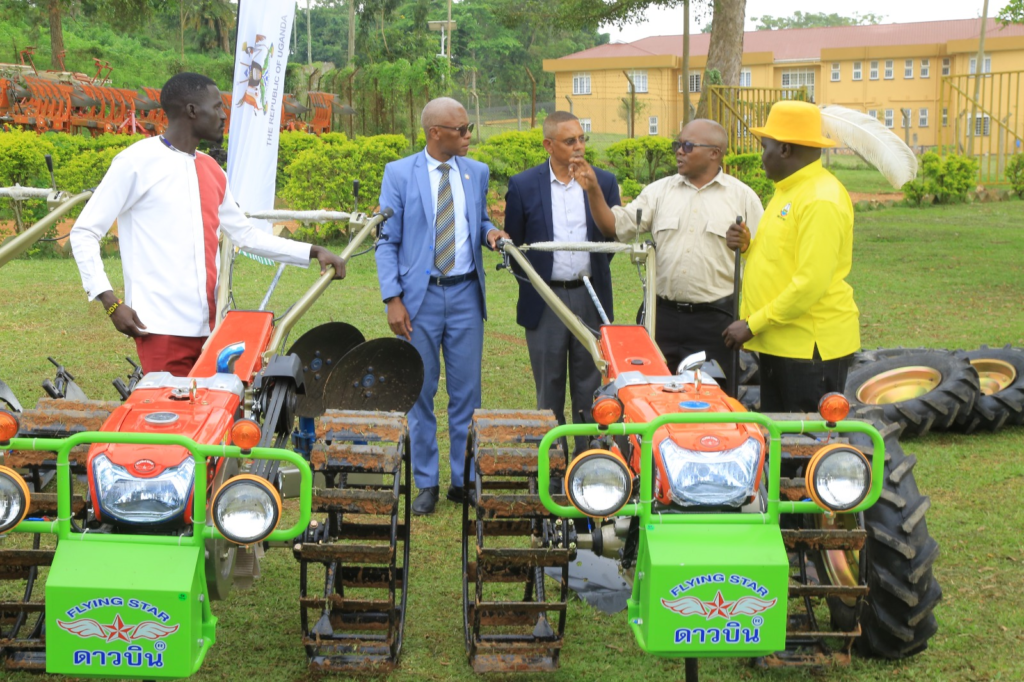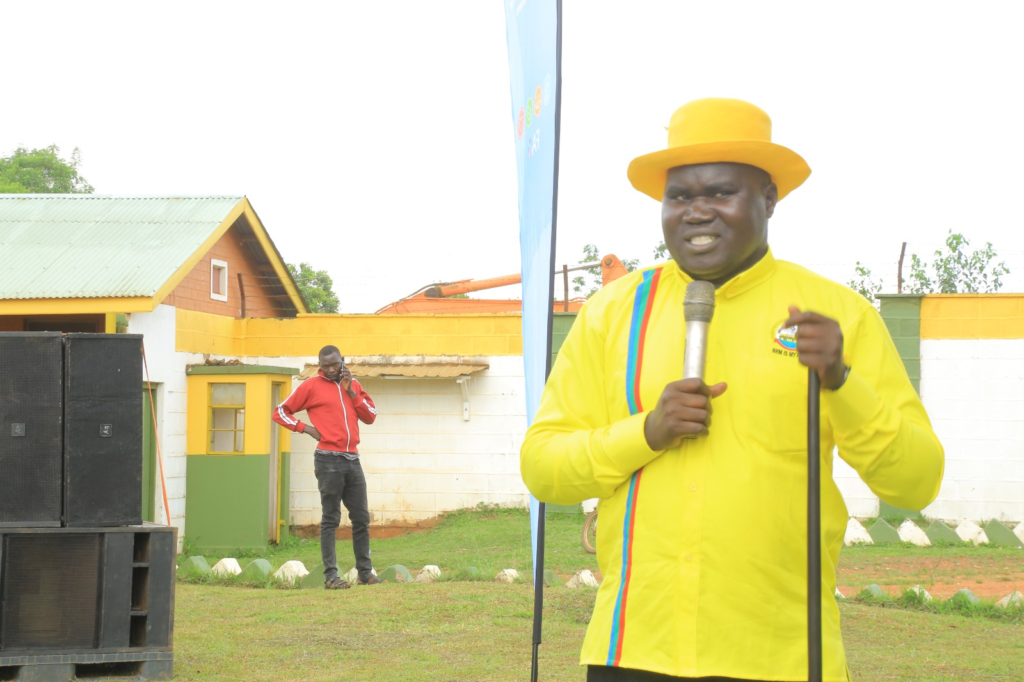By JOSEPH MARY BUWULE

WAKISO
In a major step toward enhancing food security and agricultural productivity in the Karamoja sub-region, the Food and Agriculture Organization (FAO) of the United Nations, in partnership with Uganda’s Ministry of Agriculture, Animal Industry and Fisheries (MAAIF), has handed over 55 walking tractors to farmers.
The equipment was officially delivered on Monday at the National Agricultural Mechanization Referral Centre in Namalere, Wakiso District. The initiative is part of the “Fostering Sustainability and Resilience for Food Security in the Karamoja Sub-region” (F-SURE) project, targeting over 12,000 farming households across the districts of Karenga, Kaabong, Kotido, Moroto, Nabilatuk, and Nakapiripirit.
The mechanization package includes 55 units of 14-horsepower walk-behind tractors, each equipped with mouldboard ploughs, integrated seed and fertilizer planters, tractor trailers, maintenance kits, water bowsers, and hose reels for irrigation. Motorcycles and tricycles were also provided to support extension services and logistics.
Transforming Agriculture Through Mechanization
Dr. Antonio Querido, the outgoing FAO Country Representative in Uganda, emphasized the transformative power of agricultural mechanization.
“This equipment will revolutionize the lives of its recipients. We firmly believe that mechanization is key to transforming Africa’s agri-food systems. For too long, we have relied on manual tools like the hand hoe, which result in inefficient production,” he said.

Jointly developed by MAAIF, FAO, and the United Nations Development Programme (UNDP), the F-SURE project seeks to address long-standing challenges in Karamoja’s agricultural sector.
“Our goal is to introduce technologies that enhance productivity. We are proud to have engaged over 12,000 farmers through the F-SURE component,” Dr. Querido added.
Government Reaffirms Commitment
Eng. Waneloba Francis, representing the MAAIF Permanent Secretary, reiterated the government’s commitment to inclusive agricultural development.
“We are particularly keen to ensure Karamoja is not left behind. We’re promoting a shift from traditional pastoralism to agro-pastoralism, where both livestock and crop production coexist and thrive,” he noted.
He emphasized the importance of improving livestock breeds and adopting sustainable land-use practices to reduce long-distance migrations, limit farmer-herder conflicts, and increase crop yields.
Strengthening Food Security and Resilience
Dr. Paul Ayella from MAAIF highlighted the progress under the F-SURE project’s dual implementation model.
“The first component, led by UNDP, focuses on policy development and district-level incentives. The second, led by FAO, has expanded land under sustainable land and resource management, significantly boosting Karamoja’s agricultural productivity,” he explained.
From Pastoralism to Agro-Pastoralism
Historically, the Karamojong people have relied heavily on pastoralism—especially cattle rearing—for their livelihoods. But changing climate conditions, prolonged droughts, insecurity, and targeted development efforts have spurred a gradual transition to agro-pastoralism. This approach, supported by government and development partners, aims to build resilience and ensure long-term food security.
Local Leadership Welcomes Support
Kotido District LCV Chairperson, Mr. Lotee Paul Komol, expressed gratitude on behalf of the region.
“On behalf of the people of Karamoja, I express our deepest appreciation. FAO has been a vital partner in Karamoja’s development, even before I assumed leadership,” he said.
He praised MAAIF’s critical role, saying:
“You are the backbone of Uganda’s development. Your success is central to the President’s vision, and Karamoja has high expectations of your efforts.”
Looking Ahead: Infrastructure, Training, and Sustainability
Beyond tractors, the project includes over 40 water boilers and irrigation kits aimed at improving water access and enhancing climate resilience. Extension workers will offer ongoing support, while farmer groups will receive training in equipment handling, agribusiness, and sustainability.
Dr. Querido emphasized that FAO will continue to work closely with local communities to ensure long-term impact.
“We will continue supporting these groups to ensure the project has a lasting effect,” he assured.
The 55 single-axle tractors will be distributed among smallholder farmer groups and incorporated into farmer field schools to promote mechanization from the grassroots. FAO will also deploy technical advisors to train farmers in business planning and profitability.
Eng. Francis confirmed MAAIF’s commitment to ensuring the equipment is well maintained:
“We are putting in place structures to ensure proper use, operation, and maintenance,” he said.
A Region Ready for Agricultural Transformation
With the right tools, knowledge, and infrastructure, Karamoja is poised to transform its agricultural landscape. Mr. Komol urged MAAIF to fast-track additional support initiatives, including constructing mega-dams in all nine districts of the sub-region.
“This would significantly accelerate our region’s development. We pledge our support and cooperation, especially with Minister Francis, to transform Karamoja,” he said.
Dr. Querido noted that the handover of 55 walking tractors marks a pivotal step in Karamoja’s pursuit of food security and economic resilience. With strong backing from FAO, MAAIF, and other partners, the region is beginning a new chapter in sustainable agricultural transformation.
“Together, we’re committed to transforming the agricultural landscape in Uganda and beyond.” He added.